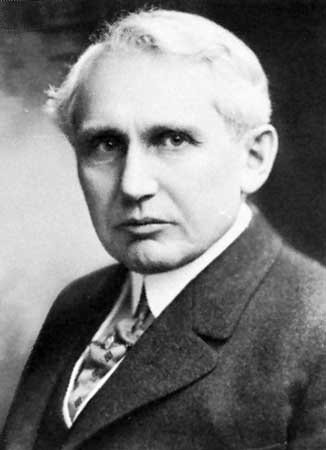Kellogg, Frank B.
American politician
in full Frank Billings Kellogg
born Dec. 22, 1856, Potsdam, N.Y., U.S.
died Dec. 21, 1937, St. Paul, Minn.
 U.S. secretary of state (1925–29) whose most important achievement was the Kellogg-Briand Pact of 1928 (Kellogg-Briand Pact), a multilateral agreement designed to prohibit war as an instrument of national policy. He was awarded the Nobel Prize for Peace in 1929.
U.S. secretary of state (1925–29) whose most important achievement was the Kellogg-Briand Pact of 1928 (Kellogg-Briand Pact), a multilateral agreement designed to prohibit war as an instrument of national policy. He was awarded the Nobel Prize for Peace in 1929.Kellogg studied law and was admitted to the bar in 1877. He achieved prominence as a lawyer representing the U.S. government in antitrust cases and served in the U.S. Senate (1917–23) and as U.S. ambassador to Great Britain (1923–25).
As secretary of state under President Calvin Coolidge (1925–29), Kellogg generally followed an isolationist policy regarding European affairs, but he helped arrange an international conference at Geneva (1927) that sought unsuccessfully to limit naval armaments.
In 1928 the French foreign minister, Aristide Briand (Briand, Aristide), had evolved a plan for a bilateral pact outlawing war as a tool of national diplomacy. Kellogg delayed for months, partly fearful of a two-nation entanglement. Prodded into action by vocal American proponents of the “outlawry of war” movement, he succeeded in broadening the agreement to include 62 nations, among them all the major powers. Although widely heralded and recognized with the Nobel Prize, the Kellogg-Briand Pact was nevertheless full of loopholes and devoid of means for effective enforcement.
Kellogg later (1930–35) served on the Permanent Court of International Justice.
- corm
- Cormack, Allan MacLeod
- Cormac McCarthy
- Corman, Roger
- cormorant
- corn
- Cornales
- Corn, Alfred
- Cornaro, Caterina
- Corn Belt
- cornbread
- cornea
- corn earworm
- Corneille de Lyon
- Corneille Heymans
- Corneille, Pierre
- Corneille, Thomas
- Cornelia
- Cornelia Adele Strong Fassett
- Cornelia Connelly
- Cornelia Maria Clapp
- Cornelia Otis Skinner
- Cornelis and Frederik de Houtman
- Cornelis Drebbel
- Cornelis II Floris